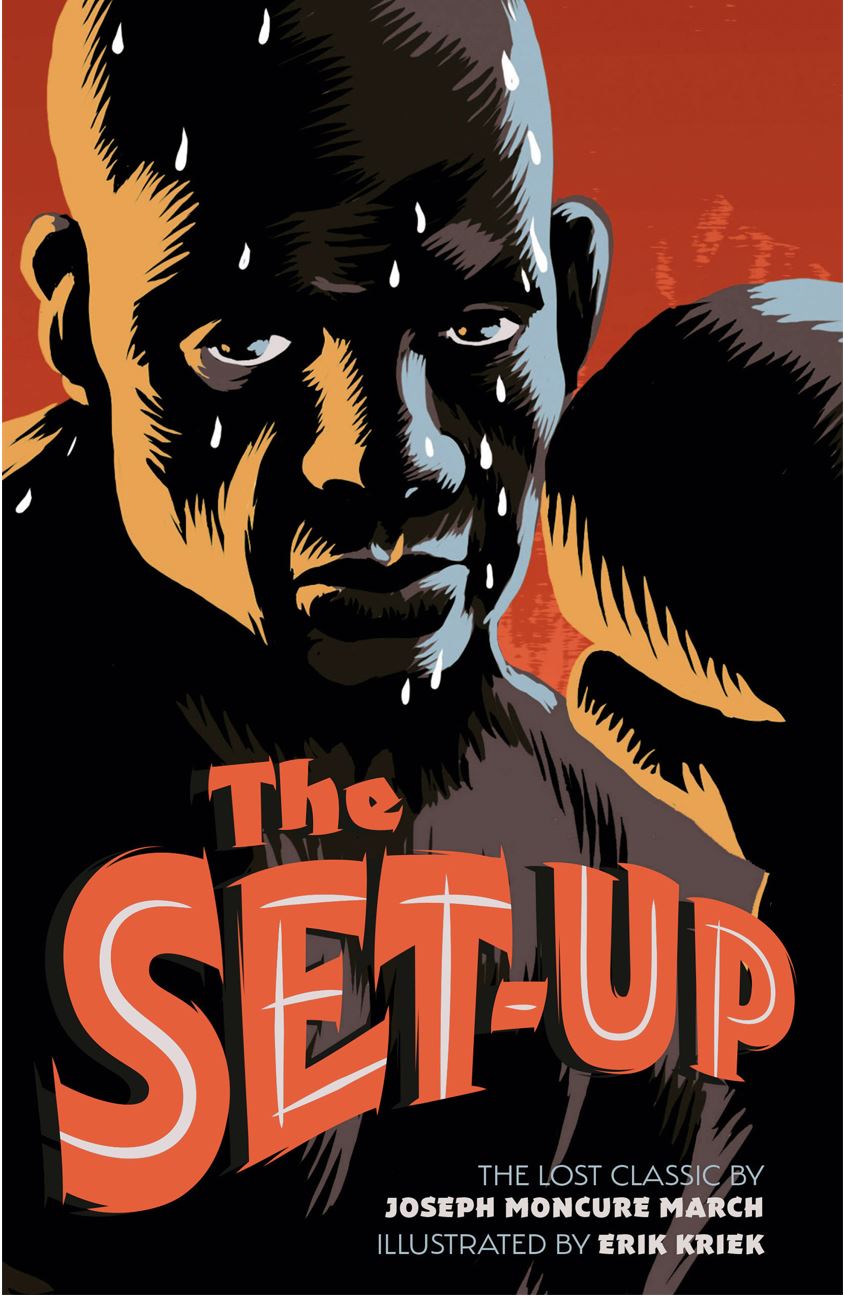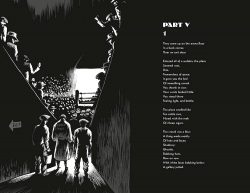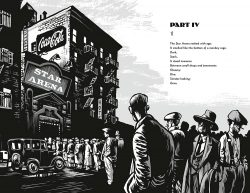 By Joseph Moncure March illustrated by Erik Kriek (Korero Press)
By Joseph Moncure March illustrated by Erik Kriek (Korero Press)
ISBN: 978-1-91274-008-6 (HB) eISBN: 978-1-91274-012-3Â
I’ve never understood boxing as a sport. Where I come from, you don’t hit people for money or fame but because you don’t like them, have a grievance with them or because they’re a member of the Tory Cabinet. I suppose that’ s pretty much the same thing these days.Â
However, it’s an indisputable fact that for billons of humans over thousands of years, pugilism in its various forms has captivated, enthralled and on rare occasion, enhanced the lives of those both participating and spectating. Â
Entire sub-cultures have embraced the Fight Game and it has in return elevated a few (some actual combatants, but a far greater number of managers, promoters and – disturbingly – “owners†of society’s officially sanctioned domestic gladiators) to positions of wealth and power. Many love to watch and many more are irresistibly drawn to compete… Â
Despite – or more likely because of – modern rules and legal oversight the industry is apparently not as flagrantly in the pockets of crime bosses as in its early golden years, but once upon a time in the mid-20th century Boxing matches were the great leveller: drawing hoods and heroes, media stars and mobster scum, intellectuals and imbeciles…Â
In 1928, white Jazz Age poet and essayist Joseph Moncure March wrote a highly successful and influential long-form poem about boxing that stripped away much of the glamour by focussing on the criminality and poverty-driven desperation that underpinned it. Â
March was a war veteran, a college protégé of Robert Frost and first managing editor of The New Yorker, and infamous for his other poem. Bawdy, antisocial, deliberatively provocative and shocking, The Wild Party took three years to find a publisher. The Set-Up was similarly divisive and influential. You can find all you need to know about the odes and their author in Masha Thorpe’s brilliantly informative and erudite Introduction which combines appraisal and appreciation with history lesson in a critical biography of the pioneering poet. It also candidly discusses the major bone of contention this uncompromising revival will stir up: Race.  Â
Protagonist Pansy Jones is an ex-con, over the hill fighter: an old Negro grateful for one final chance at a payoff against a younger, fitter, tougher opponent. It’s his last bout and he wants to go out with pride and dignity. Sadly, the match is fixed, but his crooked promoters have opted not to tell him and kept his portion of the pay-off for themselves…Â
It sounds cliched now, but that’s because the printed poem was a monster hit during the Depression Era, spawning countless swipes and a popular but utterly bowdlerised 1947 noir film adaptation which omitted the uncompromising elements of commonplace bigotry the saga wallows in. Â
Although in 1947 the author strenuously protested the replacement of Pansy with a white fighter, when The Set-Up was rereleased in 1968, March himself “de-nationalized†the tale, removing the brooding racial tensions and character that carried the original.Â
What we have here now is the restored original text which wallows in grime, crime and poverty with fully-realized, universally grotesque, sordid and unsavoury characters all taking their piece of the action from desperate men pummelling each other for other people’s callous gratification…Â

 The tale is told in relentless rhyme and pitiless beats presaging modern Hip Hop culture: brutal, bleak, repetitive; glorifying another kind of gang culture and clinging to the notion of a last chance to win if you are man enough. This is dawn-era storytelling with classical themes delivered as primordial Rap in its purest, most primal form: drenched with aggression, hostility, nihilism, misogyny, explicit but accepted racism and, always, frustrated hope.Â
The tale is told in relentless rhyme and pitiless beats presaging modern Hip Hop culture: brutal, bleak, repetitive; glorifying another kind of gang culture and clinging to the notion of a last chance to win if you are man enough. This is dawn-era storytelling with classical themes delivered as primordial Rap in its purest, most primal form: drenched with aggression, hostility, nihilism, misogyny, explicit but accepted racism and, always, frustrated hope.Â
March eschews conventional stanzas for explosive couplets, displaying verbal virtuosity and building scene-setting mood through a driving beat and mesmerising rhythm. Visually they are delivered in this edition like blows, laid in typographic blasts in clinches with starkly effective illustration cunningly informed by the works of graphic genius Will Eisner.Â
The art is astounding, crafted by a modern master with his head firmly set towards past times.Â
Amsterdam-born Erik Kriek (In the Pines – 5 Murder Ballads; silent superhero spoof Gutsman; Little Andy Roid; Welcome to Creek Country; Mika, the Little Bear That Didn’t Want to Go To Sleep) is a graduate of the Rietveld Academy for Art and Design and an in-demand illustrator of books – such as Holland’s Tolkien and Harry Potter editions – magazines, apparel, skateboards, ad infinitum. Â
As well as being a musical historian and afficionado, he can turn his hand to many visual styles and graphic disciplines. Gutsman was reconceived as a soundless mime ballet in 2006 and his collection of Lovecraft adaptations Het onzienbare, en andere verhalen H. P. Lovecraft has been republished in many languages…Â
Here he again extends his artistic range and demonstrates chiaroscuric virtuosity and versatility in the resurrection of a landmark of American poetry and precursor of noir sensibilities that has, in its own way, also reshaped the landscape of modern popular culture. You already know the story from a hundred other sources, so I’m not saying more, but I will share a few interior pages…Â
Restored and beautifully augmented by stunning potent imagery, The Set-Up is a found classic addressing issues we still all struggle with and is a contest you must see.
© 2022 Korero Press Ltd. All rights reserved.Â
The Set -Up will be published on April 21st 2022 and is available for pre-order now.Â
